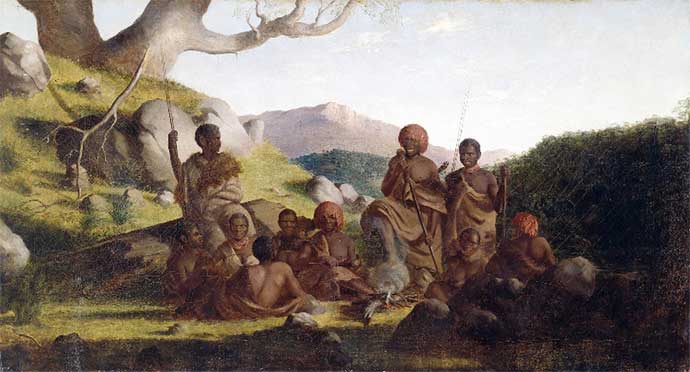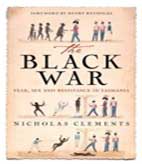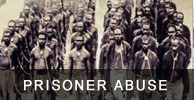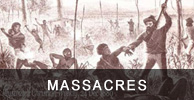Tasmania's Black War: a tragic case of lest we remember?
Nowhere was resistance to white colonisers greater than from Tasmanian Aborigines, but within a generation only a few had survived the Black War.

Click to enlarge and painting details
Tasmanian Aboriginals 1856-1857 by Robert Dowling (National Gallery of Victoria)
Nicholas Clements The Conversation 24 April 2014
Tasmania's Black War (1824-31) was the most intense frontier conflict in Australia's history. It was a clash between the most culturally and technologically dissimilar humans to have ever come into contact. At stake was nothing less than control of the country, and the survival of a people.
Around 1000 lives were lost, but the loss of cultures and histories was far costlier. Had it happened elsewhere, the Black War would be common knowledge. Yet nearly two centuries on, most Australians know almost nothing about it. This Anzac Day it is worth reflecting on the price we pay for such ignorance.
For the first decade or more after Britain settled Tasmania in 1803, its tiny outposts on the Derwent and Tamar rivers never comprised more than a few thousand poorly equipped colonists. The vast majority of the island remained under Aboriginal control and conflict was infrequent. This soon changed following the defeat of Napoleon and settlement of the island's interior was proceeding apace by the mid-1820s.
This invasion of tribal lands was the ultimate cause of the Black War, but it was not just the white man's presence to which Aborigines objected. There were six times as many white men in the colony as there were women, and almost none of the latter were available to frontiersmen.
Predictably, some of these men employed violence to procure sex with Aboriginal women and children, and this appears to have been the war's main proximate trigger.
Among our deadliest wars
As more and more colonists flooded in, Aboriginal attacks soared from 20 in 1824 to 259 in 1830. War parties torched dozens of properties, plundered hundreds of homes and speared thousands of sheep and cattle. Even more devastating was the human toll: 223 colonists killed and 226 wounded.
This represents an annual per capita death rate two-and-a-half times higher than that of Australians in World War Two. Almost every colonist lost somebody they knew. The war's 200 or so Aboriginal survivors, exiled to Flinders Island in the early 1830s, lost nearly everyone they knew, together with their country and their way of life.
At first glance this suggests a very uneven conflict. Yet there is evidence for only 306 specific killings of Aborigines between 1824-31 and the true figure might not have been much higher than double that.
The apparent asymmetry stems from the fact that most of the island's several thousand original inhabitants were probably not killed by white men directly, but rather by the disease, internecine conflict and general bedlam they introduced.
What's more, Aborigines could not replenish their numbers, while every colonist they killed was replaced by a hundred more.
Although they lost the Black War, the efforts of Tasmania's Aborigines deserve to be commemorated. Armed with just spears and clubs, they put up the stiffest resistance of any indigenous people anywhere in Australia. They pressed the fight until scarcely two dozen of them remained.
We know the names of many. We even have portraits of some, such as Thomas Bock's haunting sketch of Tongerlongerter, the celebrated resistance leader who severed and cauterised his own arm after it was shattered by a white man's bullet. Such characters are worthy of our intrigue, and our admiration.
We should also remember the British dead, most of whom were transported for trivial offences, only to meet their deaths in a strange land at the hands of an even stranger enemy. Some had never held a gun, much less fired it into an Aboriginal camp; others had killed their black enemies at every opportunity, but all were victims of circumstance.
Regardless of their guilt or innocence, these luckless men and women are pivotal to Tasmania's history, and it is essential that we learn their stories too.

Proclamation boards posted during the Black War depicted a policy of equality
starkly at odds with the brutality of the conflict.
An excuse to forget
Growing calls for the Australian War Memorial to commemorate the nation's frontier wars have been steadfastly rejected. They did not involve the Australian military, runs the objection.
This is technically correct; Tasmania was a British colony until 1901. Nevertheless, colonial forces played a significant role in the island's frontier conflict, which culminated in 1830 with the Black Line - the largest domestic offensive in Australia's history. This ambitious seven-week operation involved 550 soldiers and 1,650 settlers and convicts - fully 10% of the colony's population.
But military or no military, the Black War was just that - a war - and everyone from the governor to the field-hand acknowledged it as such.
The War Memorial's obstinacy reflects a more general ambivalence among Australians towards the skeletons in their national closet. The cultural brokers of the last century have taught us to graze contentedly on a lean historical diet of sporting heroes, rural battlers and of course Anzac legends. Underlying this stultifying trend is the assumption that acknowledging our ancestors' mistakes will undermine our national pride and identity.
This is misguided, to say nothing of condescending. As many other countries have shown, a nation that confronts its past, owning its mistakes and learning from them, can only inspire pride.
My grandfather is a decorated World War Two veteran. We meet every Anzac Day and pay our respects to his fallen mates. The speeches are always moving; though the only mention of the colonial frontier I can recall was a dignitary noting how "peaceful" it had been.
Anzac Day commemorates numerous conflicts, from the Boer War to the Boxer Rebellion, but the Black War is not among them. This perplexes my grandfather, as it does a growing number of Australians. It was not just a war fought in Tasmania, it was a war fought for Tasmania.
 Nicholas Clements
Nicholas ClementsHonorary Research Associate at University of Tasmania
Nick completed his PhD at the University of Tasmania in 2013, looking at the conflict between Aborigines and settlers on the Van Diemen's Land frontier between 1803-1842. His current research interests include, among other things, Australian contact history and the more recent history of the West Tamar district in northern Tasmania.

BLACK WAR by Nicholas Clements RRP $34.95 - ISBN 978-0-70225-006-4, pb, 2014
Between 1825 and 1831 close to 200 Britons and 1000 Aborigines died violently in Tasmania's Black War. It was by far the most intense frontier conflict in Australia's history, yet many Australians know little about it. The Black War takes a unique approach to this historic event, looking chiefly at the experiences and attitudes of those who took part in the conflict. By contrasting the perspectives of colonists and Aborigines, Nicholas Clements takes a deeply human look at the events that led to the shocking violence and tragedy of the war, detailing raw personal accounts that shed light on the tribes, families and individuals involved as they struggled to survive in their turbulent world.
National Library of Australia Bookshop Buy Book Online






